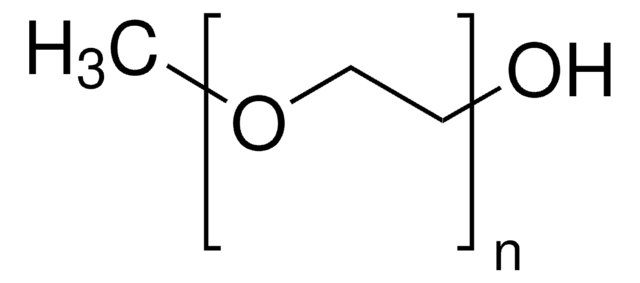おすすめの製品
フォーム
powder or chunks
分子量
PDLA average Mn 55,000 (by NMR)
PEG average Mn 5,000 (by NMR)
色
white to tan
保管温度
−20°C
類似した製品をお探しですか? 訪問 製品比較ガイド
アプリケーション
Carboxylic acid-poly(ethylene glycol)-b-poly(D,L lactide) is a functionalized, amphiphilic, diblock copolymer composed of a hydrophilic PEG block and a hydrophobic PLA block. These biodegradable, biocompatible polymers can self-assemble to form nanoparticles, such as micelles and polymersomes, in both aqueous and non-aqueous media. Due to these properties, these polymers are widely used in polymeric nanoparticle formulation to achieve controlled and targeted delivery of therapeutic agents (e.g. APIs, genetic material, peptides, vaccines, and antibiotics). The carboxylic acid functional group on the PEG chain enables rapid and facile surface functionalization, allowing for these materials to be used in applications such as targeted drug delivery.
保管分類コード
11 - Combustible Solids
WGK
WGK 3
引火点(°F)
Not applicable
引火点(℃)
Not applicable
適用法令
試験研究用途を考慮した関連法令を主に挙げております。化学物質以外については、一部の情報のみ提供しています。 製品を安全かつ合法的に使用することは、使用者の義務です。最新情報により修正される場合があります。WEBの反映には時間を要することがあるため、適宜SDSをご参照ください。
Jan Code
909289-BULK:
909289-VAR:
909289-100MG:
最新バージョンのいずれかを選択してください:
Ren Zhong Xiao et al.
International journal of nanomedicine, 5, 1057-1065 (2010-12-21)
Due to their small particle size and large and modifiable surface, nanoparticles have unique advantages compared with other drug carriers. As a research focus in recent years, polyethylene glycol-polylactic acid (PEG-PLA) block copolymer and its end-group derivative nanoparticles can enhance
R Gref et al.
Science (New York, N.Y.), 263(5153), 1600-1603 (1994-03-18)
Injectable nanoparticulate carriers have important potential applications such as site-specific drug delivery or medical imaging. Conventional carriers, however, cannot generally be used because they are eliminated by the reticulo-endothelial system within seconds or minutes after intravenous injection. To address these
ライフサイエンス、有機合成、材料科学、クロマトグラフィー、分析など、あらゆる分野の研究に経験のあるメンバーがおります。.
製品に関するお問い合わせはこちら(テクニカルサービス)








